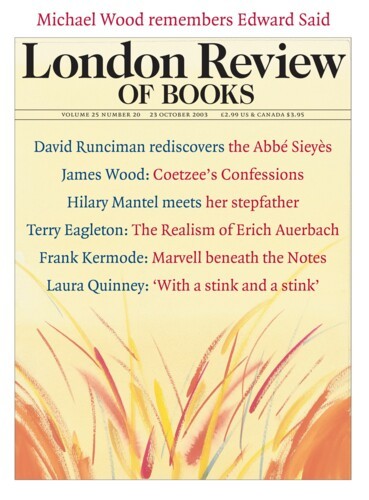When Robert Graves left Charterhouse School in 1914, the headmaster wrote in his report: ‘Well, goodbye, Graves and remember that your best friend is the wastepaper basket.’ (Charterhouse is the public school that was recently reported to be replacing its tuckshop with a branch of Starbucks, but in fact isn’t.) Graves’s first books of poetry were published a couple of years later: perhaps the poems made his ex-mentor feel abashed, if he even remembered making the remarks; or perhaps the poems only confirmed him in his opinion. Either way, the report itself would long ago have been consigned to the wastepaper basket, had it been right. It’s been retrieved and uncrumpled most recently in Could Do Better: School Reports of the Great and the Good, edited by Catherine Hurley, and just out in paperback (Pocket Books, £5.99). ‘The joy in reading many of the reports in this collection,’ Hurley writes in the introduction, ‘is discovering those that are spectacularly wrong as well as those that are spectacularly right.’ Right or wrong, the rude ones are the best. Jilly Cooper’s is particularly enjoyable; I’m not convinced Cooper didn’t make it up herself: ‘Jilly has set herself an extremely low standard which she has failed to maintain.’
Charterhouse is in Godalming. Godalming, unlike Winchester and Slough, doesn’t feature in The Idler Book of Crap Towns: The 50 Worst Places to Live in the UK (Boxtree, £10). The Idler is a magazine founded on the ‘conviction that laziness has been unjustly criticised by modern society, and that it deserves to have its good conscience returned to it and defended as an essential component of a happy life.’ Still, Sam Jordison and Dan Kieran, the compilers of Crap Towns, have been pretty busy: ‘We have scoured the nation collecting nominations for Crap Towns until we could plot a Crap Map . . . The 50 towns we’ve selected for this book are the places that have been nominated the most often by the public on the website and made us laugh the most.’ Fiftieth in the hit parade is St Albans; number one is Hull. Hull’s most famous librarian went to school in Coventry (not a Crap Town): Larkin’s teachers found him ‘quite satisfactory’, but thought he ‘would be better still if he brought more enthusiasm to his work’. He’s quoted in Crap Towns: ‘I wish I could think of just one nice thing I could tell you about Hull, oh yes . . . It’s very nice and flat for cycling.’ Crap Towns lists famous residents, but not famous disparagers. Spike Milligan once did a show in Portsmouth, which narrowly misses the top ten. He was billed as Spike ‘I hate Portsmouth’ Milligan; it wasn’t his most successful gig ever. A British soldier in Iraq, after hearing that Geoff Hoon had compared Umm Qasr to Southampton, disagreed with the Defence Minister: ‘There’s no beer, no prostitutes, and people are shooting at us,’ he said. ‘It’s more like Portsmouth.’
Halfway through the top ten, I discovered that every town I have lived in is crap. To take just one, the one in which I was born, the ninth crappest town in Britain: ‘Basingstoke was a small inoffensive market town until 1961 when it was chosen to receive London overspill. Now it’s large and offensive.’ From Crap Towns I learn that Basingstoke’s motto is ‘Steadfast in Service’: famous Basingstokeans include Tanita Tikaram, Sarah Ferguson and Liz Hurley (no relation, presumably, to Catherine, who grew up in Canada). Claiming that Sarah Ferguson comes from Basingstoke is pushing it: she grew up on the 876-acre family farm at Dummer, safely south of the M3, gentility’s bulwark against the town which sprawls along the motorway’s north side. I remember a newspaper interview with Tanita Tikaram (never heard of her? Shame on you) from some years ago which began: ‘She came from nowhere. Or, more precisely, Basingstoke.’ Crap Towns juxtaposes a photograph of Saddam Hussein’s victory arch in Baghdad, cast at a foundry in Basingstoke, with a picture of the remarkably similar sculpture outside Basingstoke railway station. ‘One of Basingstoke’s claims to fame is that the first train fatality occurred there.’ The book also points out that being home to the tallest building between London and New York isn’t such a big deal, and that Basingstoke no longer has the largest multi-storey car park in Europe. One of its denigrators tells the following story:
I’ve never been to Basingstoke, but I met a man who did. While staying at the Philippe Starck-designed Paramount Hotel just off Times Square in New York, I felt sorry for the young guy whose job it was to open the door whenever anyone wanted to enter or leave. I stopped to chat, and offered my sympathy for having such a tedious job. He replied: ‘I’m from Basingstoke – nothing’s boring after that.’
There’s a spirited defence from Basingstoke’s MP, Andrew Hunter. First up in the town’s favour is that ‘traffic flows relatively smoothly’. Then, ‘the M3 is at our back door, the M4 within easy reach; so are Heathrow and Southampton airports.’ The great thing about Basingstoke is that it couldn’t be easier to leave.
Send Letters To:
The Editor
London Review of Books,
28 Little Russell Street
London, WC1A 2HN
letters@lrb.co.uk
Please include name, address, and a telephone number.

